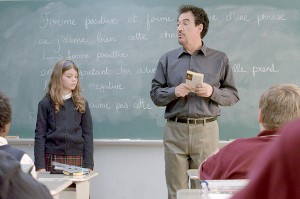By the end of the opening scene of the Canadian drama, Monsieur Lazhar, it’s clear that the new teacher of the title is unafraid to talk about death in front of his young students. The film follows this Algerian immigrant, Bachir Lazhar, who substitutes in a sixth grade class in Montreal after the teacher kills herself. Students learn to deal with loss, sadness, death and acceptance, with the help of Lazhar, who is silently recovering from his own personal tragedy.

The 2011 film, which is in French with English subtitles, won several awards and was nominated for the Oscar in the foreign film category. Lazhar, who is played by Algerian actor Mohamed Saïd Fellag, guides his students with a calm dignity that, ideally, ought to make parents and school principals line up to shake his hand. Spoiler alert: Most don’t. Sadly, it’s not an ideal world, but at least it’s Canada. Full disclosure: I’m a proud Canuck.
A film like Monsieur Lazhar, however, can only take place outside of the United States. It manages to avoid the melodramatic Hollywood treatment that ruined teacher-as-hero movies like Mr. Holland’s Opus and Dangerous Minds. And its subtle approach to a delicate situation is thoroughly Canadian. Based on my experience navigating New York City’s education maze, it is unrealistic for an American setting.
There were several instances when I thought that if the film had taken place south of the Canadian border, the school’s administration would have certainly interfered, preventing Lazhar from teaching. In fact, I was stunned that Lazhar was even given the job. I nearly gasped at his audacity when he sought a teaching position without credentials in hand, like a framed master’s degree in education. More teachers are showing up in U.S. schools without official education degrees, with the proliferation of programs like Teach for America. But they never show up unannounced, like Lazhar did, when he strolled into the office of the principal, Madame Vaillancourt. As an education reporter in New York City, I often find it difficult to receive access to talk to a principal on the phone. Maneuvering past the security guards who are stationed at the entrances of many NYC school buildings is another hassle.
Lazhar is an unconventional teacher, not just for the small school community he joins, but likely for the American audiences who view the film. He teaches diction from an 18th century French novelist. He slaps the head of Simon, the class troublemaker, for which Madame Vaillancourt mildly rebukes him. What, no outraged parents demanding that he lose his job? Lahzar encourages students to talk about their feelings of their teacher’s violent death without worrying about the psychological repercussions.
Dare I say, excusez-moi, that Monsieur Lahzar was refreshingly un-American? There were no signs of administrative tests to verify the quality of Lazhar’s teaching. Even the hints of racism were distinctly Canadian, Québécois style. One straight-laced student, Marie-Frédérique, questions Lazhar’s language abilities because he apparently taught outdated grammar lessons that were probably passed down to generations of post-colonial Algerians. Racial tensions, subtle and overt, exist in Montreal because many immigrants from former French colonies make the city their new home. The film explored race without exploiting it for a dramatic scene. Death is dramatic enough.
While I would love to wax on about Canada and its education system — its ironic laissez-faire method that simplifies and centralizes public education by placing power in the hands of provincial governments — Monsieur Lazhar doesn’t necessarily represent Canadian public education. The film seems to take place in a private school, which is probably why the principal had the authority to hire Lazhar on the spot.
Still, Monsieur Lazhar is a breath of fresh, un-politicized, air for people interested in understanding the dynamics of student-teacher relationships during a moment of crisis. Without the bureaucratic red tape and the Hollywood glitter, it’s beautiful to watch how a teacher handles a devastating situation, while struggling with his own loss, with the dignity and grace that will surely leave an impression upon his young students.
In the aftermath of a tragedy, students would be fortunate to have a teacher like Monsieur Lazhar.


